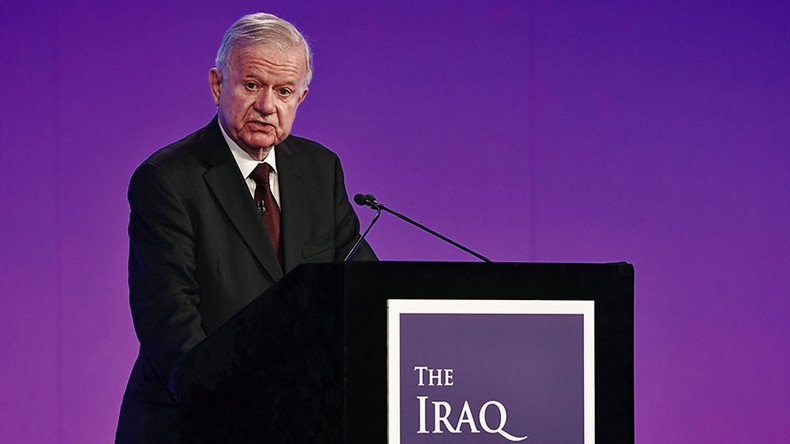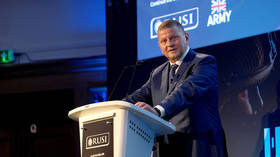‘Chilcot reveals: Case for Iraq war made before weapon inspections'

It would be good to see that on the basis of the Chilcot report Tony Blair could potentially face prosecution for war crimes, Anne Machon, former British intelligence officer told RT. Other experts also weighed in with their opinions.
Seven years later, and at a cost of £10 million (US$ 13 million), analysts are now busy pouring through the much-anticipated 2.6 million-word Chilcot report to better understand exactly what the government of then-Prime Minister Tony Blair knew before it decided to follow the United States into what has been a monumental disaster for the Iraqi people.
No matter how damning this Chilcot report is believed to be, it could be much worse, according to host of RT’s Going Underground Afshin Rattansi.
RT: According to WikiLeaks, top UK and US officials have been discussing the consequences of the Chilcot inquiry for the two countries. What can you tell us regarding this?
Afshin Rattansi: We were talking about the UN Security Council; some believe the Chilcot report may lead to Britain leaving its position on the UN Security Council. According to Sir John Chilcot, it seemed to be undermining the British government. A cable from 2009 – so this is after the terms of reference were agreed by Chilcot, and we have a cable dated September 22, 2009 addressed to Hillary Clinton, then Secretary of State of the US, as well as the US ambassadors to Geneva, to Vienna, to New York, and Vienna presumably, because of weapons inspections.
In it, it clearly states that at a meeting with David Miliband, the Blairite Foreign Secretary, and a meeting with Jon Day, the Ministry of Defense’s Director General, it says clearly that this American official addressing this secret cable to the US “that there was a promise given by the British government that the UK had put measures in place to protect your interests during the UK enquiry into the causes of the Iraq war.” So no matter how damning some people believe this Chilcot inquiry report to be, it could conceivably be much worse.
The truth could be much, much worse.
RT: Former Prime Minister Tony Blair is under fire and under pressure over the Chilcot report. Where is George W. Bush these days? What do you think there will be a reaction from Washington to this report?
AR: Of course the media will concentrate on individuals. There were 254 Labour MPs – some of them trying to overthrow the leader of the opposition here who voted for war. So whether George W. Bush gets off or not, or Tony Blair gets off or not, may be another matter. But it is a vindication: from the first words of Sir John Chilcot at the press conference currently going on: he said that the “case for war was made before weapons inspections.”
It is a vindication for people like government scientist David Kelly, who was driven to his death by the Labour government, who tried to expose him. And other weapons inspectors who were constantly being undermined by a preconceived idea to invade Iraq regardless of what they were doing. I should just add a little bit about journalists. Let’s remember the Director General of the state-mandated BBC was sacked. So journalists who are trying to do their job and uncover the kind of things that Chilcot has uncovered today after 7 years – they were sacked. Other people paid with their lives, and of course millions were bereaved, died and have been displaced by the Iraq war.
#Baghdad bleeds & mass murder stalks the land. 2003 #IraqWar continues by imperialism's proxy terrorists. #Chilcotpic.twitter.com/7StITEswlI
— Sami Ramadani سامي (@SamiRamadani1) July 4, 2016
'Too many questions by families of killed UK soldiers'
Political risk analyst Shwan Zulal said British families whose children died in the Iraq war will have a lot of questions for the government. Why soldiers were led into a war, which was not based on evidence that Saddam posed a risk to UK citizens?
RT: The report claims Blair deliberately exaggerated the threat and ignored warnings that invasion could strengthen terrorists. Why do you think he did that?
Shwan Zulal: The real motive is very clear from [George] Bush and [Tony] Blair before they went to war: they wanted to remove Saddam Hussein. This is understandable. At the time I did support the war. As an Iraqi I suffered under Hussein, and I know how brutal the Saddam regime was. However, when you look at the finding of this report it is very clear that Tony Blair obviously took those decisions based on flawed intelligence first of all, and secondly, he didn’t really take advice. For example, the joint intelligence committees were very clear in saying the Islamic extremists and Al-Qaeda were one of the biggest threats after an invasion. And 13 years later we can see Islamic State (IS, formerly ISIS/ISIL) now in Iraq with the sort of advances they make and how they control vast swaths of Iraq and… the suffering inflicted on the Iraqi people...
The Americans failed in creating a harmonious society here in Iraq. On the contrary they divided the nation; they introduced sectarianism within Iraqi politicians; and they put the foundation for a divided society in a divided country. - Saad Matlabi, deputy head of Baghdad Council’s Security Committee, told RT's Going Underground program.
RT: Are you surprised with the content of the report? Did you expect it to be this critical?
SZ: This report is really about how decisions were taken in Whitehall in the buildup before and after the war; and how the war in Iraq was handled. Let’s not forget the 179 British servicemen who died in that war – their families want answers. They obviously want to know why their children were led into a war, which was not based on evidence that Saddam posed a risk to UK citizens. The families want to know why the British soldiers were not adequately equipped. For example, there were a lot of shortages in armor, and various other equipment for the military; the preparation was very short, the British military was not really prepared to go to that war. And the Ministry of Defense pushed the agenda through and those families will have a lot of questions.
What next for US-UK cooperation?
Business between American and British intelligence services behind the scenes will stay as usual, but politicians will have to make the right noises in response to the Chilcot report, Annie Machon, former British intelligence officer told RT.
RT: Tony Blair has already responded to the report by denying the accusations, but perhaps he genuinely thought he was acting in Britain's best interests by going to war?
Anne Machon: I am sure he believes that. However, the warning were very clear and they reported over decade ago that Baroness Eliza Manningham-Buller, at the time the head of MI5, the UK domestic security service, had very clearly warned him that if Iraq were invaded, if Saddam Hussein were toppled, then, if there were indeed weapons of mass destruction or other munitions, they would fall into the hands of our potential terrorist enemies, thereby endangering British national security further. That is proven to be true.
The response from MI5 has been at noted odds to the response of MI6 during the war on terror. MI6 facilitated and gave and fed in false intelligence into that decision to go to war. MI5 was warning against it. And looking at the shambles that is now in Libya, where again we intervened, again a so-called dictator was toppled, and again the rebels took power in the country, and there is now a civil war. Again we all seeing that those are the weapons, which were available to the previous dictator and now are falling into the hands of our terrorist enemies, and not least ISIS, as well as Al-Qaeda. It is a complete mess every which way you look at it.
RT: Earlier, Blair did admit the operation in Iraq could have contributed to the rise of Islamic State (IS, formerly ISIS/ISIL). According to the Chilcot report, Blair was warned in advance that it would lead to the rise of terrorism around the world. Why did he ignore the warning?
AM: I think that is an answer that can be given only by Blair himself. One can speculate that he wanted to step on the international stage by offering George Bush unqualified support in the invasion of Iraq; in prosecuting the war on terror. That is indeed what the UK has done, apparently against its own national interests. Now I do understand the pain of the families of the soldiers who lost their lives in Iraq. I can understand the pain of the families of all those who are dead, misplaced, displaced and maimed in Iraq as well. It would be lovely to see that on the basis of the Chilcot report Blair could potentially be opened to prosecution under war crimes – the crime of aggression…
“Iraq today is completely ruined. Over a million of people were killed by the war; the infrastructure is destroyed. Heath, education, agriculture, industry – all destroyed. We have one of the most corrupt regimes in the world based on a constitution imposed by the US and Britain on the Iraqi people. You are talking about the society being threatened even more. The war continues. I don’t think they planned anything and they didn’t need to wait for Chilcot to pronounce it. - Sami Ramadani, Iraqi-born lecturer in sociology and a political exile from Saddam's regime who campaigned against US-led sanctions and the invasion and occupation of Iraq, told RT's Going Underground.
RT: How will the report influence relations between the UK and one of its closest allies - the United States.
AM: Politically it will have to be seen to have an impact. That is the play that goes on within the international politics. However, fundamentally there is very close cooperation between the intelligence agencies in the US and the intelligence agencies in the UK. In fact, the relationship between the NSA [National Security Agency] and its British equivalent GCHQ [Government Communications Headquarters] is probably the closest intelligence relationship in the world; it underpins the UKs so-called special relationship with the US.
I think behind the scenes it will be business as usual, but the politicians will have to be seen to make the right sounds, the right noises in response to this report. It is a shame the report didn’t come out earlier. Obviously it has been delayed for seven years. During those seven years we have seen failed invasions of Libya and failed intervention in Syria as well…
The statements, views and opinions expressed in this column are solely those of the author and do not necessarily represent those of RT.












